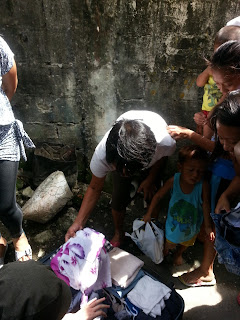an essay by Roger B Rueda
In Barotac Nuevo, football is a religion to a lot of people. It is so profoundly, so fervently entwined
into the fabric of Barotacnon culture that the two entities are intricately
linked – they define each other and share an intrinsic uniqueness, an instantly
recognisable image. Being the Football Capital of the Philippines, Barotac
Nuevo has transformed football an expressionistic art form and an effective
tool for social cohesion. It has hordes of incredibly gifted players who have
made their way to the national shores over the last few decades. Amongst them
are Ian Araneta, Yanti Barsales, and Chieffy Caligdong –
all are on the Philippine ‘Azkals,’ our national football team.
Barotacnon youngsters play football on the streets, on waste
ground, concrete; any available surface. Most of the teenagers have no boots,
so they play unshod, further promoting an ability to strike the ball properly.
They love dancing and partying aside from playing football. They also work hard
and are very creative. They use their mornings to help their families in
household errands and use their afternoons to play football. The beautiful game
keeps them exultant even though their families couldn't meet the expense
of sending them to school. In a word, Barotacnon children always treasure each
moment whenever they play football.
Barotacnons are gentle, kind, and fascinating. They are friendly and talkative people. They
are law-abiding, fond of food, concerned with their religion, familiar with
agriculture, and expert at fishing.
Barotac Nuevo is seat of the Iloilo State College of Fisheries (ISCOF), the Western Visayas
College of Science and Technology (WVCST), and St Paul’s School. Thus, they earn it the title as the Educational
Centre of the Fourth District of Iloilo. (The institutions have created and expanded the town's elite.) Further, it has a hospital run by Western Visayas Medical Centre and a radio station in ISCOF at Tiwi.
Sandwiched between Dumangas and Pototan, the town has developed a unique version of Hiligaynon with some hint of Kinaray-a. It can be called perhaps as Hiniray-a. It is spoken by about 51,867 locals.
It’s famous for baye-baye,
sweet delicacy made from coconut water, grated scraped young coconut meat,
sugar, and toasted pinipig (crushed
rice grains). It is believed that the first baye-baye was made of ground roasted corn and was cooked by a farmer's wife in Sohoton. It’s sold at bus stops or on a bus itself as some hawkers climb
on it.
History
Capitan Simon Protacio, the recognised head (chair) and the
wealthiest denizen of the place, established the town of Malutac in 1811 in the Spanish time. The town was renamed Barotac Nuevo in March 1812. The name Barotac is a portmanteau of the Spanish word baro which means mud, and the Hiligaynon word malutac,
which means muddy; (for one, the ground here smells of rain in June and people muddy their feet or slippers when they walk. The soil here is smooth to the touch. When moistened, it’s soapy slick. When you roll it between your fingers, dirt is left on your skin.) Nuevo, which means new, was added to classify it from the town 19 miles up north named
Barotac, which was later called Barotac Viejo, to distinguish the two Barotacs from each other, perhaps to make it clearer.
On the word of the traditional stories narrated by tradition-bearers, Barotac Nuevo in the 1600's was legendary far afield with its purebred horse ranches, and Tamasac,
a tireless white mount was the strongest, fastest, and finest in the neighbourhood. It was quick thinking, agile, and sure footed. The horse was meant to be Barotac Nuevo’s emblem - of strength and courage, and perhaps uniqueness of its own experience: then, someone bestowed a good-looking horse from India on the Governor-General Manuel
Gonzalez de Aguilar (4 March 1810 - 4 September 1813), but they couldn't find any horse in Manila, which they could use as a pair of the horse to draw the Governor-General’s carromata, a light, two-wheeled, boxlike vehicle.
De Aguilar’s servants rambled through the islands in search of another horse until they
got to the town of Dumangas in Iloilo. Malutac then was only a ward (a
barangay) of Dumangas. They spotted Tamasac, a lovely slender looking horse that had great endurance qualities and was very spirited, as he whinnied. They hankered after the horse at a
price the rancher wanted, but Capitan Protacio would not sell it even though he was agreeable to
give it without charge on condition that Malutac should be made a pueblo, a Spanish settlement. (By the way, tamasac means splash, the sound made when something hits water or falls into it.)
The men hurried back to Manila and passed on the Governor-General what Capitan Protacio wanted in exchange for his horse. In all seriousness, the Governor-General didn't turn him down. He rather wrote a letter to the
Gobernadorcillo of Iloilo to grant Malutac autonomy from the town of Dumangas and declare
its township as soon as possible. Thus now, Capitan Simon Protacio and Tamasac loom in the
plaza of Barotac Nuevo, after the late mayor Bernardo Siaotong put up the statue as a symbol of gratitude of the Barotacnons and commemorated the two icons by inscribing their names on the headstone, in 1926.
The country had been at war for years, so the latter long part of the life of Barotacnons was spent in obscurity and terror, and those years were a nightmare to some.
On 13 June 1944, a Tuesday, Barotac Nuevo celebrated its first fiesta since the beginning of the the Second World War, to honour the death of St Anthony of Padua, the patron saint of lost and stolen articles.
Since then, the town of Barotac Nuevo, appropriately bustling and energised, has been considered
a flourishing rural town in Iloilo with countryside that offers a more peaceful and less congested living environment. Its growth is ascribed to
its abundant natural resources – agriculturally and aquaculturally.














